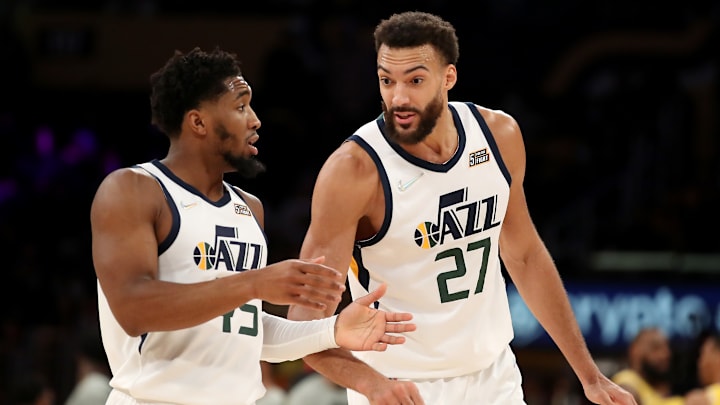It's true that the Utah Jazz teams led by Donovan Mitchell and Rudy Gobert did not achieve much in the postseason. However, they knew when it was time to cut bait and start over, and they cashed in when they did.
They acquired plenty of assets when they traded Mitchell and Gobert, which no one really questioned at the time. Two years later, the trades look even better even though the Jazz's current direction as a franchise has come into question.
Bleacher Report's Daniel Favale and Grant Hughes reflected on the trades while looking back on the biggest NBA trades of the last 10 years. TLDR: the Jazz made out well from their perspectives.
Jazz given re-grade of A for Donovan Mitchell trade
Though Favale gave Jazz high marks for what they got in return for Mitchell, he also listed some concerns regarding the assets at their disposal long-term.
"Concern starts to creep in and prevents them from nabbing a perfect re-grade on two fronts.
"For starters, the distant Cleveland first-rounders no longer seem as juicy. Garland (free agent in 2028), Mitchell (2027-28 player option), Mobley (2030 free agent) and Jarrett Allen (2029 free agent) are all under long-term team control. The Cavs may still have to reorient the core at some point, but they'll have the leverage in trade talks to ensure the floor never gets ripped out from underneath them."
He also added how the Jazz have fared since the Mitchell trade has thus far proven to be problematic and why that might not stop.
"But Utah may also be a victim of underestimation. It has outperformed early-season expectations each of the past two years. That necessitated midseason selloffs and shutdowns—none of which resulted in them securing higher than a No. 9 pick.
"This leaves the Jazz in a funky position, ostensibly too good to tank without resorting to extremes yet not nearly ready enough to make noise in the Western Conference. Their next re-grade will hinge on what they do next."
Because of that, Favale asked a plethora of questions regarding the Jazz's future, and not just from the Mitchell trade.
"Do they have enough youth to lean on Markkanen-plus-kids and increase their draft-lottery equity? Will they get lucky with one of their Cleveland (or Minnesota or Lakers) first-rounders? Can they use the bevy of assets at their disposal to acquire a player better than Markkanen who can serve as their organizational compass? Make no mistake, it's a good problem to have, but if transcending the middle is the goal, it's a problem all the same."
Favale's points are valid. Even though these are good assets, they can all be for naught if they don't lead to anything. They could lead to trades for Trae Young or Brandon Ingram, but it depends on if the Jazz think those are the best moves for them.
Jazz given re-grade of A+ for Rudy Gobert trade
Hughes did not go into much detail on why the Jazz made out well on the Gobert trade. He summarized it pretty quickly.
"The Jazz offloaded a costly veteran for an absolute mint, supercharging their rebuild," Hughes wrote. "Even with Gobert playing as well as he has, the Wolves wouldn't come anywhere close to getting what the Jazz did if they were to trade the big man today. That's a win."
These trades can't really be looked at until the Jazz get to see just how much they reap the rewards from Mitchell and Gobert. Those results aren't going to come for some time, but it would be difficult to see how the Jazz didn't do well when they traded them.
